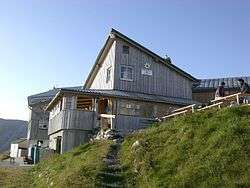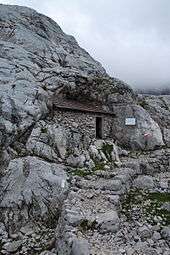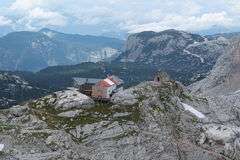Simony Hut
The Simony Hut (German: Simonyhütte) is an Alpine club hut belonging to the Austrian Alpine Club (OeAV) located at a height of 2,205 metres, just below the Hallstätter Glacier at the foot of the Hoher Dachstein in Austria. The hut, which is named after Friedrich Simony the first person to ascend Hoher Dachstein, is high above Hallstatt in Upper Austria in the northern part of the Dachstein Mountains. It is open year-round and, in winter, offers numerous options for ski tours and snowshoe walking.[1]
| Simony Hut | |
|---|---|
 | |
 Simony Hut | |
| Coordinates | 47°30′2″N 13°37′25″E |
| Country | Austria |
| Mountain range | Dachstein Mountains |
| Location | foot of the Hoher Dachstein |
| Nearest settlement | Hallstatt |
| Elevation | 2,205 m (7,234 ft) AA |
| Administration | |
| Hut type | OeAV hut Category I |
| Owner | Austrian branch of the ÖAV |
| Website | www |
| Facilities | |
| Beds/Bunks | 40 |
| Mattresses | 90 |
| Emergency beds | 5 |
| Total bedspaces (incl. winter room) | bedspaces |
| Winter room | winter_room |
| Opening times | all year |
| Footnotes | |
| Hut reference | OeAV DAV |
The Simony Hut is an important base for climbers because they are able to set out from here on long tours over the Dachsteins. There is also a mountaineering school where training courses are run for glacier or ice climbing. The Dachstein Chapel is nearby.
History
.jpg)
In 1843 a stone rest and emergency shelter, known as "Hotel Simony", was opened just below the site of the present hut.
In 1876, Friedrich Simony selected the present location himself for construction of the first free-standing wooden building. The opening ceremony was held on 18 August 1877. Over a decade later, the hut had become a popular destination for climbers. The structure was enlarged between 1891 and 1893 to compensate for the increasing numbers of visitors. Further works were carried out from 1922 to 1933, and the hut underwent a general restoration in 1953. No further alterations were made to the original structure after the last major renovations between 1961 and 1963 when a power supply was also added.
In 1977, the Simony Hut a celebrated its centenary as a climbing and alpine training centre. In 1989 a biological treatment plant was opened to treat human waste (upgraded in 1998). A large modern annex was opened in July 1999.[2]

As the Simony Hut lies near the Hallstätter Glacier, most routes require knowledge of glacier crossing with appropriate equipment. The only exceptions are the paths to the Wiesberg House and the Gjaidalm.

Approaches
- From Gjaidalm (1.750 m, Dachstein Cable Car from Obertraun) via the Hüttenweg path, medium difficulty, duration: 2½ hours
- From Hunerkogel (2.690 m, Dachstein South Face Cable Car from Ramsau via the Hallstätter Glacier, only for the experienced, with Klettersteig equipment, duration: 1½ hours
- From Hallstatt (515 m) via the Wiesberg House, physically challenging, duration: 6 hours
- From Obertraun (540 m, valley station Dachstein Cable Car) via the Gjaidalm, physically challenging, duration: 6 hours
Crossings
As the Simony Hut lies near the Hallstätter Glacier, most routes require knowledge of glacier crossing with appropriate equipment. The only exceptions are the paths to the Wiesberg House and the Gjaidalm.
- Wiesberg House (1,887 m) via Hochplateau, medium difficulty, duration: 1 hour
- Adamek Hut (2,196 m)
- via Hohen Trog and Hoßwandscharte (wind gap), medium difficulty, duration: 4½ hours
- via Hallstätter Glacier, Steinerscharte (wind gap) and Gosau Glacier, duration: 3½ hours
- Seethaler Hut (2,740 m) via the Hallstätter Glacier, duration: 2½ hours
- Dachsteinsüdwand Hut (1,910 m) via Hallstätter Glacier and Hunerscharte (wind gap), duration: 4½ hours
- Austria Hut (1,638 m) via Hallstätter Glacier, Austriascharte (wind gap) and Edelgrieß, duration: 5 hours
- Guttenberg House (2,146 m) via Hallstätter Glacier, Gjaidstein saddle and Gruberscharte ( wind gap), duration: 6 hours
- Schilcher House (1,740 m) on the Gjaidalm, via the Hochplateau, medium difficulty, duration: 2 hours
Ascents
- Hoher Dachstein (2,995 m) via Seethaler Hut, only for the experienced, UIAA grade I-II, safety features in places, duration: 3½ hours
- Hoher Gjaidstein (2,794 m) via Eisseen, Gjaidkar and Notbiwak, only for the experienced, pathless in places, duration: 2½ hours
- Hoher Ochsenkogel (2,520 m) via the Hohen Trog, medium difficulty, pathless in places, but signed, duration: 2 hours
- Schöberl (2,422 m) via the medium difficulty Klettersteig, only with equipment, duration: 45 minutes
- Taubenkogel (2,301 m), duration: ca. 2 hours
- Other summits only climbable with Alpine experience and local knowledge because they are largely pathless: Hohes Kreuz (2,837 m), Niederer Dachstein (2,934 m), Eisstein (2,654 m)
See also
- Laufen Hut, at the foot of the Fritzerkogel mountain in Salzburg, Austria.
References
- https://www.hallstatt.net/about-hallstatt/active-summer-holiday/wanderzeit-en-US/mountain-huts-and-alpine/simonyhut/
- oeav-events.at Archived 2009-12-29 at the Wayback Machine 125 Jahre Simony Hut Abgerufen am 27. Dezember 2008